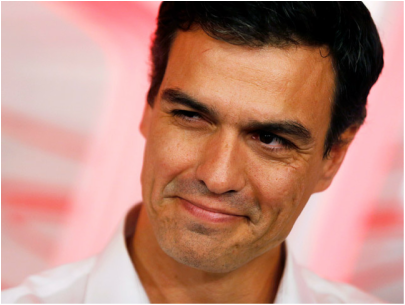 Pedro Sanchez Pedro Sanchez Pedro Sanchez leader of the Socialist Worker's Party (PSOE) in Spain refused to allow Mariano Rajoy of the rival People's party to form a government. This move has infuriated many within the party. An attempted coup against him resulted in a long eleven-hour long meeting of the federal executive in which Sanchez' plan of holding a leadership contest within three weeks was rejected by a vote of 132 to 107. Shortly after the vote, Sanchez resigned and a caretaker leader was appointed. The party will need to decide its next step in order to avoid a third general election in just over one year. Sanchez has adamantly refused to take any action that would support the return of Rajoy's conservative People's party to power. He claimed that the Rajoy government had done too much damage to the Spanish economy and was hopelessly entangled in corruption scandals. However, many voters in Spain are anxious for a solution to the political crisis in spite of the shortcomings of Rajoy's government. Adversaries within the PSOE hold Sanchez responsible for the poor showing of the PSOE in recent elections. Sanchez was unrepentant:“As I said yesterday and as I’m saying again today, my parents taught me that the most important thing is keeping your word. That was my word, which I gave to all the members and to the federal committee, too, when it came to the party’s position on Rajoy’s investiture process.” Opponents in the party had begged Sanchez to allow Rajoy to govern. Susana Diaz, the party leader in Andalucia, often suggested as Sanchez' successor, said that Sanchez should put the needs of the country before the needs of the party. The PSOE now has a month to decide on what to do. If there is no political solution then King Felipe could dissolve parliament and call for elections once again to be held at Christmas. While Rajoy may now be able to count on help from the PSOE, it will come at a high price for the party. Rajoy's position is now much stronger and at the same time the more radical Podemos party is sure to gain more adherents from the defeat of Sanchez and his supporters within the PSOE. Podemos could very well become the dominant voice of the left within Spain. Pablo Simon, of Carlos III University in Madrid said that the PSOE had been badly wounded by internal strife and was in no mood for any further elections as they would be sure to lose even more votes and seats:“The Socialist party is so weakened, so destroyed and so ripped apart that all it can do is limp on. If it’s going to negotiate, it can only do so with its hands up. His (Rajoy's) conditions are going to be very harsh. It seems he’s going to look for their support to make sure he has four easy years in office.”Simon said that a number of potential leaders inclluding Diaz would find their reputation damaged by the move against Sanchez. Any new leader would need to be comeone who was not part of the move to depose Sanchez he claimed. Simon thought that the wound within the PSOE would be hard to cure in the near term and he thought that there would be a long rule of rightist forces in Spain. Simon said of the PSOE: “Why is the PSOE eating itself away? There’s the crisis of international social democracy, plus memories of Zapatero’s economic management, plus the pro-independence process that has deprived it of its key store of votes in Catalonia, plus a rival party to its left that is taking its votes from under-35s and those on peripheral areas. These four simultaneous crises make it very difficult to lead the party no matter who the leader is.” Pablo Iglesias, leader of the left Podemos party, called the trouble within the PSOE "the most important crisis since the end of the civil war in the most important Spanish party of the past century." Iglesias would be happy if Podemos replaced the PSOE as the voice of the Spanish left. In recent elections in Galicia and the Basque country, the PSOE finished behind Podemos.Former leader of the PSOE Felipe Gonzalez claims that Sanchez had promised him that he would respect the wishes of those within the PSOE by dropping his objection to allowing Rajoy to form a minority government. Shortly after Gonzalez made his accusation half of the PSOE executive committee resigned. Those resigning thought that their action would force the committee to dissolve and the leader to step down with a caretaker leader put in place. Instaed it forced the meeting on the plan of Sanchez to hold a leadership convention, but as the plan was voted down, Sanchez did end up resigning. The political crisis is matched by an economic crisis as the Spanish economy falters. Unemployment is still very high :Despite a decline in 2015, the youth unemployment rate remains among the highest in the EU. Total unemployment is now 21% but still almost one out of two of active people aged between 15 and 24 remain unemployed. And long-term unemployment remains double that of 2008. The unemployment rate would be even higher except that Spaniards have left the country to look for work elsewhere in Europe (the UK and Germany) or even Latin America. The rate of net emigration has reached 250,000 a year, draining the economy of some of the most educated and productive young citizens.Regional governments are deep in debt and as a result are forced to make huge cuts in their budgets causing service to inhabitants to be cut or decline in quality. Some areas with national interests such as the Basque country are making noises about separation from Madrid. Capital investment is low as is profitability so the outlook for growth in the economy is dim. The situation will not be improved by a weak political leadership.
0 Comments
Your comment will be posted after it is approved.
Leave a Reply. |
Like this writer's work please donate:
Ken Hanly
Ken is a retired philosophy professor living in the boondocks of Manitoba, Canada, with his Filipina wife. He enjoys reading the news and writing articles. Politically Ken is on the far left of the political spectrum on many issues.
Archives
November 2016
Categories
All
|
 RSS Feed
RSS Feed

